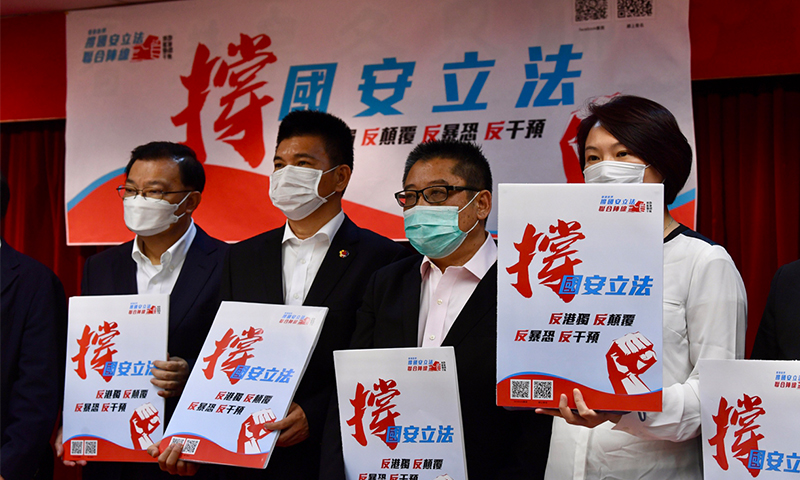Top legislature may propose draft of natl security law for HK at this week’s session: HK coalition head
By Zhang Hui Source:Global Times Published: 2020/6/17 11:42:10

The United Front Supporting National Security Legislation holds a press conference on Monday, saying that 2.92 million Hong Kong citizens have signed a petition in support of the proposed national security legislation. Photo: cnsphoto
China's top legislature will speed up formulating the national security law for Hong Kong, a senior official from the legislature said.Yue Zhongming, spokesperson for the Legislative Affairs Commission of the National People's Congress (NPC) Standing Committee, made the remarks on Tuesday, ahead of the 19th session of the Standing Committee of the 13th NPC on Thursday and Saturday. According to the NPC's decision on Establishing and Improving the Legal System and Enforcement Mechanisms for the Hong Kong Special Administrative Region to Safeguard National Security, speeding up the formulation of related Hong Kong national security laws has been added to the NPC Standing Committee's 2020 work plan, Yue said.
Kennedy Wong Ying-ho, deputy secretary-general of the Hong Kong Coalition who just spoke to a Hong Kong deputy on this week's session, told the Global Times on Wednesday that so far, the agenda of the session has not mentioned the draft Hong Kong national security law, but it's possible that lawmakers have completed it.
If finished, the draft could be proposed by the chairman of NPC standing committee during the session, and there could be an additional session to review the draft given the urgency of the law, Wong said.
The NPC standing committee has accelerated the soliciting of public opinions in Hong Kong, as the central authorities have held at least five forums to solicit public opinions from Hong Kong society since the NPC voted to pass a draft decision on establishing the law on May 28.
Wong previously said he believes that the law is likely to be enacted within a month.
Improving legislation on public health has also been part of the NPC Standing Committee's 2020 work plan, including revising the Wildlife Protection Law, the Frontier Health and Quarantine Law, the Law on the Prevention and Control of Infectious Diseases and the Emergency Response Law, Yue said.
RELATED ARTICLES:
Posted in: HK/MACAO/TAIWAN,CHINA FOCUS